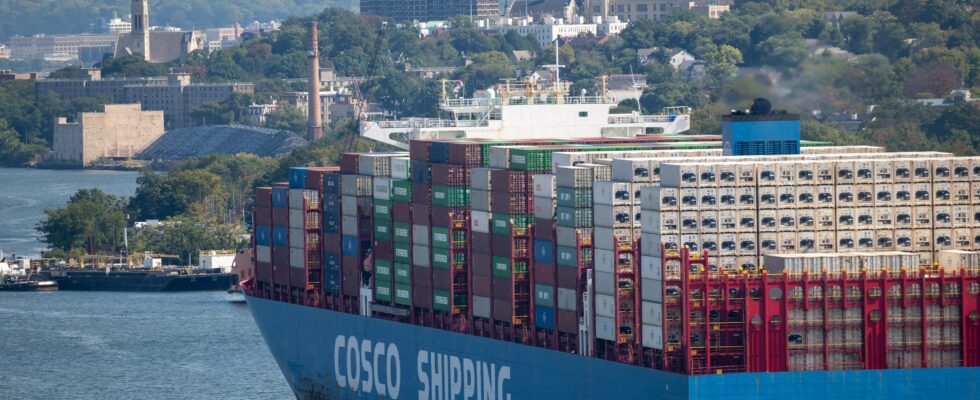Dockworkers at 14 major American ports began walking out early on Tuesday, October 1, after the failure of last-minute negotiations between their union and the Maritime Alliance. The strike at the Port of Virginia, one of the affected facilities, “began at 12:01 a.m.” Tuesday, the port said on its website, adding that discussions between the United States Maritime Alliance (USMX) , which represents employers, and the ILA union “are at an impasse”. Monday evening, the two parties announced that they had resumed their negotiations which, which began in May, stumbled over wages and automation.
“Over the past 24 hours, the USMX and the ILA have exchanged counter-offers regarding salaries,” the Maritime Alliance said in a statement Monday evening, specifying that it had “improved” its proposal and requested a extension of the social agreement to continue negotiating. According to a source close to the discussions, the proposal detailed by the Alliance corresponds to that rejected Monday morning by the union.
The ILA union planned to strike as soon as the six-year labor agreement expired at 11:59 p.m. Monday (5:59 a.m. French time Tuesday) in ports on the East Coast and Gulf of Mexico. Asked by AFP, the Alliance and the union did not react immediately. The USMX represents employers in 36 ports scattered along the coasts from Maine (northeast) to Texas (south), on the Gulf of Mexico, to Florida (southeast). Opposite, the dockers’ union has 85,000 members in the United States (ports, rivers, lakes).
The expiring social contract concerns 25,000 members, working in the container and rolling vehicle loading terminals of fourteen major ports (Boston, New York, Philadelphia, Baltimore, Savannah, Miami, Tampa and even Houston). The union warned on Sunday that all its members would hold strike pickets from 12:01 a.m. Tuesday, “joined in solidarity by dockers and maritime workers around the world.” The transport of hydrocarbons and agricultural products, or even cruises, should be affected only very slightly, if at all.
“Unfair pay”
“ILA members deserve to be compensated for the important work they do to keep American commerce flowing and growing,” the union said Monday morning, denouncing the “billions of dollars in profits” raked in by ports and maritime carriers, including during the Covid-19 pandemic. “Meanwhile, dedicated ILA members continue to be crippled by inflation due to unfair pay,” he continued.
The Alliance criticized the union for refusing any discussion for weeks, thereby preventing an agreement on the new six-year agreement. And Joe Biden, who presents himself as the “most favorable president to unions”, indicated on Sunday that he had no intention of intervening. Five weeks before the presidential election. However, he can activate the Taft-Hartley law – used numerous times for ILA strikes before 1977 -, allowing an 80-day moratorium to be imposed. The Federal Mediation Service (FMCS) told AFP on Monday that it was in “regular contact” with the parties and was “ready to help” if both camps agree. The USMX agrees, the ILA does not.
“No shortage of essential products”
Importers and exporters have taken the lead by shipping their products in advance. Others have opted for unloading on the West Coast, which is more costly and time consuming from Europe. But West Coast ports, covered by a separate labor agreement reached in 2023 that prohibits them from striking, could disrupt operations in solidarity. And they have little available capacity. Canadian ports could not absorb an overflow from the United States. Especially since they are also experiencing social movements, like Vancouver last week and Montreal blocked since Monday.
Oxford Economics estimates that each week of strike action would reduce US GDP by $4.5 billion to $7.5 billion. According to the Anderson Economic Group (AEG), the first week of the walkout is expected to cost $2.1 billion, including $1.5 billion in lost goods (such as perishable goods).
“We do not anticipate any shortage of essential products in the immediate future,” said Kathy Hochul, governor of New York State, at a press conference on Monday. Automakers, on the other hand, are expected to suffer from the walkout, with the ports of Baltimore and Georgia serving as an entry point for spare parts and an exit point for vehicles. Ford is monitoring the situation “closely”. The German BMW group, which manufactures several SUV models exclusively in South Carolina, does not anticipate any problems this week. Logistics group DHL, which has noted “strong demand” for its air freight services, has activated “several contingency plans” for its own shipments, including the use of alternative ports and means of transport.
